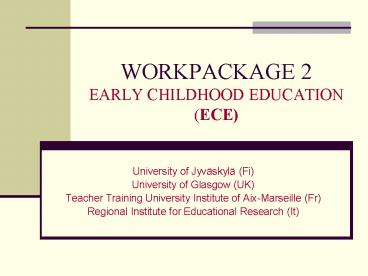WORKPACKAGE 2 EARLY CHILDHOOD EDUCATION (ECE) - PowerPoint PPT Presentation
1 / 15
Title:
WORKPACKAGE 2 EARLY CHILDHOOD EDUCATION (ECE)
Description:
June -08 Curriculum content analysis ... Background information: National contextual features of ECE ... them to take ownership over new ideas as well as assist ... – PowerPoint PPT presentation
Number of Views:51
Avg rating:3.0/5.0
Title: WORKPACKAGE 2 EARLY CHILDHOOD EDUCATION (ECE)
1
WORKPACKAGE 2EARLY CHILDHOOD EDUCATION(ECE)
- University of Jyväskylä (Fi)
- University of Glasgow (UK)
- Teacher Training University Institute of
Aix-Marseille (Fr) - Regional Institute for Educational Research (It)
2
ECE (wp2) DELIVERABLES
- June -08 Curriculum content analysis
- Dec. -08 Description of best practices
(Accumulates along pilot case studies till oct.
-09?) - Dec. -08 Factors impacting self-image
- Aug. -09 Suggestions for teacher
- training
- Aug. -09 Suggestions for ECE
- curriculum development
- Report (pp)
- Report
- demonstr. (pu)
- Report (pu)
- Report (pu)
- Report (pu)
3
ECE (wp2) - TASKS
- ORIENTATION What do we want and need what do
we have - RESESARCH content analyses, interviews,
questionnaires, (ethnographic observations?) - FIRST REPORTS AND DESCRIPTIONS of curriculum
contents and practices - TESTING THE COLLECTED IDEAS pilot case studies
in teacher training institutes (and in the field
of ece) evaluations reports - DEVELOPMENT OF THE CONTENTS OF TE IN TEACHER
TRAINING new contents and practices carried out
a report of the suggestions - CURRICULUM DEVELOPMENT OF ECE a report of the
suggestions
4
ORIENTATION BASIS (wp2)
- Mutual understanding about the concepts of
technology and technology education - Search for some educational starting points which
may help us to consider the best practical ways
to incorporate technology education (TE) into
childrens experiences in ECE - Special considerations into gender questions in
TE in early years - Shared plans (aims, methods, resources)
material, work and resources already available - Background information
- National contextual features of ECE
- Teacher training (ECE) in each institution /
country - Continuity between ECE and elementary school
education (ESE)
5
1. CONCEPTS
- Definitions can be developed together along the
process (alike WIKIPEDIA)
6
2. SOME GENERAL STARTING POINTS
- Worthwhile experiences for younger children focus
on play, discovery and exploration rather than
formal instruction. - Older children enjoy a focus on more formal and
complex experiences (science experiments,
construction, design projects planning, problem
solving, applications of learned principles)
7
2 continuing.
- It is important
- to encourage children to observe and experience
their environment (first by using the own body
and senses later by using various tools) - to stimulate childrens curiosity, creativity and
playfulness - to enhance the development of self-confidence of
children in their ability to think up and carry
out experiments and projects
8
2 continuing.
- Naming, concepts, communication, language
development are crucial in early experiences - Environmentally sustaining practices (recycling
programs, energy conservation, waste minimization
etc.) are one part of TE - Where possible it is valuable to involve children
in the planning of activities and development of
the practices of TE as this can assist them to
take ownership over new ideas as well as assist
teachers to increase the meaningfulness of the
activities for children
9
3. GENDER AND TE
- Existing role models and attitudes of people
around (toy marketing, childrens books and films
etc. media, family members, neighborhood,
teachers, peers) - Connections with the wider community (working
places) - Self-image and identity (technological identity
first through play by pretending the reality
and later by making it really) - Barriers (glass-ceilings)
- visible and invisible
- Segregation by gender in
- learning situations / teaching
- -gtadvances and negative sides
10
3. continuing .
11
4 SHARED PLANS
- How is TE included in formal curriculums of ECE?
- Are there signs of a hidden curriculum with
unequal possibilities between boys and girls? - -research ?
- How do the ECE programs currently operate?
- For example, what are childrens opportunities
for learning experiences concerning TE (supplies,
attitudes and know-how of teachers, learning
targets) ? - -gt research development (piloting)?
- Self-image and possible influencing factors? gt
research ? - Teacher education programs, curriculums,
students attitudes and capacities around TE? -gt
research development (piloting)?
- Curriculum content analysis
- Description of best practices
- Factors impacting self-image
- Suggestions for teacher training
12
4. continuing
- What kind of audits can be undertaken to review
their existing practices and curriculums? - What steps can be taken towards planning for
improvement/ development of TE in teacher
education as well as in the practice of ECE?
(Piloting) - What is already going on and available for the
project?
13
5. BACKGROUND INFORMATION
- Descriptions of the educational systems of each
country? - National ECE curriculums (in English) for share?
- Teacher training curriculums -- ?
14
5. continuing.
- The Education System of Finland
- AGE PLACE
ADMINISTRATION - 0-5 y. Early education care
Ministry of Social - (Child-care center) Affairs and
Health - 6 y. Pre-School (c-c center or
Ministry of SaH - school)
Ministry of Education - 7-15 y. Compulsory schooling (ESE)
Ministry of Education - 16-gt y. Additional 10th grade of ESE or
Ministry of Ed - General upper secondary education
or - Vocational education
- National Research and Development Centre for
Welfare and Health http//varttua.stakes.f
i/EN/index.htm - The Finnish National Board of Education
http//www.oph.fi
15
6. CONTINUITY ECE - ESE































